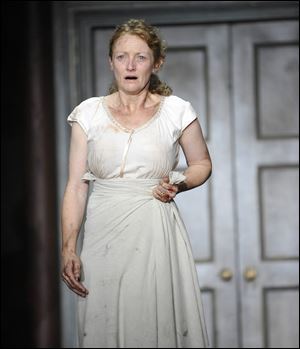
Tyranny drives searing 'Winter's Tale'
7/28/2011
Kelly Hunter as Queen Hermione in 'The Winter's Tale' in New York.
NEW YORK -- The irrational tyranny of kings is a well-mined subject in Shakespeare's plays, but the self-destructive jealousy of King Leontes in The Winter's Tale is particularly shocking, especially when performed as searingly as the current Royal Shakespeare Company production in New York, a partnership with the Lincoln Center Festival and the Park Avenue Armory.
The tragedy begins warmly, with playful young Prince Mamillius (Alfie Jones in the review performance) at an Edwardian-style Christmas party, donning a paper crown; a tragic glimpse of all that his father, King Leontes, will soon destroy in the kingdom of Sicilia. Things quickly sour, as Greg Hicks' seething portrayal of delusionally jealous Leontes takes center stage.
Kelly Hunter is warmly maternal and loving, radiating decency and honor, as the hugely pregnant Queen Hermione, yet Leontes' increasing madness causes him to view his longtime wife as a harlot, and to accuse her of having an affair with his lifelong friend, Polixenes (Darrell D'Silva,) the king of Bohemia.
David Farr's astute direction adds powerfully to the scripted impact of the random cruelty of royalty. Hicks is fearsome as Leontes, vitriolic and implacable, prowling scornfully about the stage. He brutally imprisons his wife and directs an aide to kill his old friend.
A well-cast group of courtiers pleads with Leontes to come to his senses, notably John Mackay as the loyal, decent Camillo, who sadly defects to Polixenes' court rather than obey Leontes and kill the other king.
Antigonus (a stalwart David Rubin) reluctantly takes his deluded king's banished newborn daughter to be abandoned in Polixenes' kingdom. In the midst of a terrible storm, a dreadful fate overtakes him and his party, involving a neat execution of one of Shakespeare's more famously impossible directions, "Exit, pursued by a bear."
Even the persistent Paulina, (a regal, formidable Noma Dumezweni), wife to Antigonus and close friend of Hermione, fails to persuade Leontes that he is mistaken. Hunter is majestic in her courtroom scene as, wrapped in bloodstained rags, Hermione confronts her husband, declaring her anguish at his mistreatment of her and at having her children torn from her.
Not until Apollo himself rules that Hermione is chaste and Leontes a tyrant, and Mamillius and Hermione both die, does Leontes return, tragically too late, to his senses. While a dark winter of anguished remorse settles over Sicilia, the season and mood completely change in the second half of the play to a magically bright summer festival 16 years later in Bohemia.
Pages of books are unusually applied as set decoration in Bohemia (comprising mounds of landscape, leaves on trees, and even an awesome bear, all created by designer Jon Bauser.) Book pages also adorn the crudely stomping herdsmen in the fertility dance scene.
The prevalence of pages may reflect the fantastical nature of the tale, one of Shakespeare's last works, which combines many impossible coincidences and even implies rebirth. In a play often viewed as schizophrenic, some continuity is provided by having the ruined library of Leontes provide the pages that now adorn the sunny meadows of Bohemia.
Lost princess Perdita (Samantha Young) has been raised by shepherds (comedic performances by Larrington Walker as the father, and Gruffudd Glyn as the slow-witted son) and is now wooed by Polixenes' son, Prince Florizel, in disguise as a commoner. Tunji Kasim is delightfully fresh as Florizel, while Young is sweetly shy as Perdita.
The intrusive presence of an unrepentant thief, Autolycus, adds an undertone of dark comedy to the lighthearted atmosphere. Brutishly played by a grimy, swaggering Brian Doherty, Autolycus merrily cons and steals from everyone he encounters. Colorful knit costumes, rustic festival music, and playful singing and romping reflect the life-affirming atmosphere in Bohemia, although Polixenes as a father is as capable of irrational familial wrath as Leontes.
An improbable series of events sends everyone packing to Sicilia, hot on the trail of the fleeing young lovers. In the deep sorrow of Sicilia, Paulina is still hectoring Leontes, but reconciliation, forgiveness and joy soon abound. In a breathtaking finale, the unveiling of a lifelike statue of Hermione brings the tragi-comedy to a dramatic close.
Farr's fluent combination of arresting staging, lighting (Jon Clark) and both live and recorded music (composer Keith Clouston and sound designer Martin Slavin), along with intelligent acting by the entire ensemble, create a Winter's Tale well worth experiencing. The Royal Shakespeare Company is performing five Shakespeare plays in repertory at the Park Avenue Armory, in association with Ohio University, through Aug. 14.